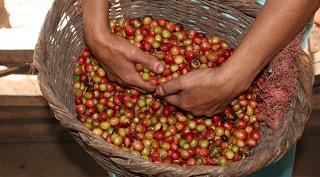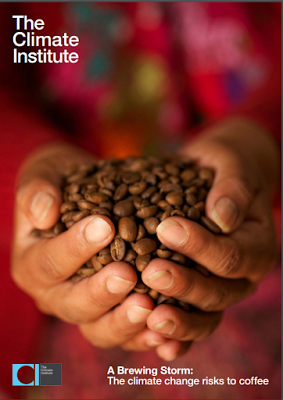This post is adapted from Partners of the Americas’ Agriculture and Food Security blog.
Happy National Coffee Day! According to a 2015 Gallup Poll, just under two-thirds of Americans start each day with at least one cup of coffee. If you’re one of those people, how did you prepare your cup this morning? Coffee is personal to those who drink it. A feeling of comfort comes over us when we take our first sip. It warms us, it powers us through our daily meetings, it brings friends together for long talks, and each culture prepares it differently. We’re particular about our coffee, we’re attached and we’re protective over it. But there’s a chilling tale to the future of coffee…
A report recently released by the Climate Institute titled “A Brewing Storm: The climate change risks to coffee” uses existing data and information compiled from a variety of studies to indicate that climate change will have a strong negative effect on the global coffee supply.
As rising temperatures threaten farmland, environments suitable for coffee farming are significantly reduced. Extreme weather including worsening droughts and heavier downpours also impact yields.
Climate changes are also intensifying the prevalence of diseases like coffee rust, a fungus that grows on the coffee leaf, and pests like the coffee berry borer, “a small, black beetle, just a few millimeters long. The females bore holes into coffee berries and then lay their eggs in the seeds within—the bits that we know as ‘coffee beans’. The larvae devour the seeds when they hatch, destroying them.” Together, they contribute to millions of dollars in lost coffee beans every year.

Because the majority of the world’s 25 million coffee producers are smallholder farmers, they often don’t have the capacity to modify their practices in response to climate change.

Partners’ Farmer-to-Farmer (F2F) program works with coffee farmers throughout the Caribbean region on issues across the gamut – from plant disease to harvesting all the way to marketing and cooperative management. The climate change risks to coffee are vast and complex but working directly with smallholder coffee farmers and cooperatives is one small way to effect change.
Cooperatives allow farmers to work together, share tips and strategies, and organize policies for the whole sector. By pooling their resources, smallholder coffee farmers are better able to access financing, obtain technical assistance on improved farming practices, and sell their product at higher prices. For coffee cooperatives in Haiti’s northern regions surrounding Cap-Haitien, recordkeeping is an invaluable asset for monitoring and controlling day-to-day business costs.
F2F volunteer and accountant Howard Fenton took on this challenge as he traveled to Haiti in June to conduct site visits and lead several trainings with the coffee cooperatives. As a result of his work, producers will be able to recognize best business practices and opportunities to capitalize on them. Specific items like developing a business plan, setting goals and planning the steps to achieve those goals, and self-evaluation are essential to a successful farm operation.
In the Dominican Republic, where our F2F Country Strategy is focused on Climate Change Adaptation in the Yaque del Norte Watershed, volunteer Judson Reid recommended diversification into fruit and vegetable crops as an alternative for coffee growers who currently face unprecedented pressure from coffee rust. Crop diversification is more easily said than done, but it is one widely accepted practice to deal with a host of agricultural issues.
Another crop adaptation strategy, according to the Climate Institute Report is shifting coffee plantations upslope. The research recognizes that farmers are resilient, resourceful, and creative but faced with a possible increase in temperature of 2 degrees Celsius in the next half-century, the global agricultural system needs to brace itself for big changes.





